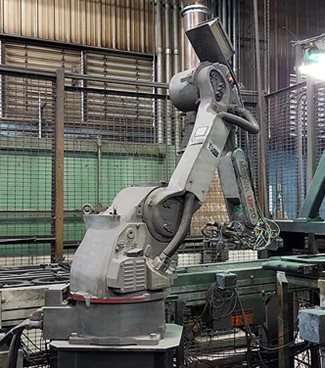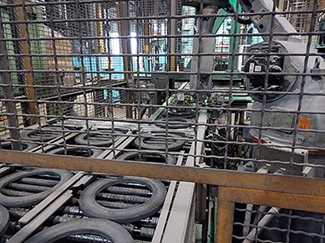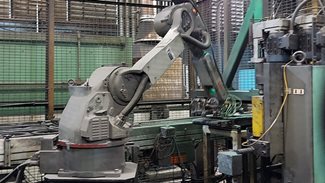 How do you maintain a factory full of robots while meeting stringent throughput goals to stay competitive in a fluctuating market? For advanced manufacturer GKN Sinter Metals (GKN) of Salem, Indiana, it means putting the bulk of preventive maintenance and repair work in the hands of their robot supplier, Yaskawa Motoman.
How do you maintain a factory full of robots while meeting stringent throughput goals to stay competitive in a fluctuating market? For advanced manufacturer GKN Sinter Metals (GKN) of Salem, Indiana, it means putting the bulk of preventive maintenance and repair work in the hands of their robot supplier, Yaskawa Motoman.
A leading producer of precision powder metal products for automotive, industrial and consumer markets, the United Kingdom subsidiary has always understood the value of equipment uptime for producing the many components it supplies to customers such as Ford, General Motors, Allison Transmissions, Toyota, Honda and more. With a passion for exceeding customer expectations, GKN has continually implemented the latest technology over the years to better impact product quality and on-time delivery.
Solution
A 2013 recipient of the Nexteer Perfect Quality Award, the team at the 220,000 sq. ft. manufacturing facility has implemented nearly thirty Yaskawa material handling robots throughout the factory to automate the furnace loading process for transmission sprockets and carriers ranging in thickness from .125 to 2.0 inches and diameter from 1 to 12 inches – with most weighing .25 to 5 pounds.
 This process – which once entailed moving each produced part manually from a briquette press to a holding area before being transferred to a coinciding furnace – now takes a fraction of the time, increasing productivity by fifteen percent. Now, parts are produced at the briquette press and conveyed to the furnace where a robot loads them onto ceramic trays that are then conveyed to a furnace. Once this step is complete, the parts exit the furnace and are conveyed to another robot that unloads them, packing them into dunnage ready for shipment.
This process – which once entailed moving each produced part manually from a briquette press to a holding area before being transferred to a coinciding furnace – now takes a fraction of the time, increasing productivity by fifteen percent. Now, parts are produced at the briquette press and conveyed to the furnace where a robot loads them onto ceramic trays that are then conveyed to a furnace. Once this step is complete, the parts exit the furnace and are conveyed to another robot that unloads them, packing them into dunnage ready for shipment.
Results
A timesaver over the prior method, the presence of robotic load automation has provided the company with other benefits as well. Along with the productivity increase, there has been noticeable cost reduction, as dunnage is no longer needed to hold the parts produced at the briquette press. A twenty-five percent savings in scrap inventory has also been realized due to less handling of parts. Subsequently, this decline in handling has also improved product quality, reducing the number of chips and dents caused by manual multi-step part transfer. Moreover, the use of robots allowed GKN to move one operator from each production location to other value-added tasks within the company.
Each robot is interfaced with an Allen-Bradley PLC control system for greater network control, and many robots are integrated with MotoSight™, a Cognex vision system that provides feature-rich functionality while reducing the cost of expensive tooling for locating parts. Furthermore, with the help of automatic tool changers, each robot is capable of processing several different parts.
Smooth implementation of robotic automation was facilitated by Yaskawa Support Services (YSS), as well as attendance by several GKN employees at the IACET-accredited Yaskawa Academy to learn the necessary robot operating skills via hands-on training. In turn, these employees have been able to take the knowledge gained to lead training sessions for other employees.
With each robot operating 24 hours a day, five days a week, maintaining a strict maintenance schedule is important to optimizing equipment uptime. However, in a busy manufacturing facility that runs a lean operation with a tight production schedule, having the time to dedicate to maintenance and repair is sparse. Not to mention the skill set required to do much of the work required is a job in and of itself. For these reasons, the team at GKN decided to bolster production and backstop their human workforce by leveraging their robot supplier’s diverse support services to provide timely and comprehensive technical assistance.
This approach to robot maintenance includes several ongoing aspects, which have contributed to increased uptime for achieving ROI within the targeted payback period of twelve to fifteen months set by the company.
Life Cycle Management
 To optimize long-term equipment performance, a maintenance plan has been tailored to suit GKN’s needs and was agreed on at the time of robot purchase. This plan stipulates that the robot supplier’s service technicians assume the responsibility of performing all robot preventative maintenance, whether it be an annual robot tune-up that includes air filter replacement, a three-year preventive procedure that performs gasket replacement, or an impromptu service suggestion by a field technician that entails connector and seal replacement.
To optimize long-term equipment performance, a maintenance plan has been tailored to suit GKN’s needs and was agreed on at the time of robot purchase. This plan stipulates that the robot supplier’s service technicians assume the responsibility of performing all robot preventative maintenance, whether it be an annual robot tune-up that includes air filter replacement, a three-year preventive procedure that performs gasket replacement, or an impromptu service suggestion by a field technician that entails connector and seal replacement.
Field Service
With factory-trained technicians strategically positioned throughout the Americas, robot repairs, programming maintenance and system audits are timely and done with the utmost care, getting GKN back in production as efficiently as possible. A 99.95% first-time fix rate by YSS has resulted in minimal downtime, accelerating ROI.
Technical Support
Rapid on-site response has been facilitated with access to a 24/7 expert coverage hotline. Furthermore, for repairs assumed by GKN, the hotline has been, and continues to be, an asset for basic repair knowledge, prompt part ordering and helpful programming tips. Online how-to videos have also been beneficial for extra support.
Parts
The GKN team has relied on the 24/7 parts availability and $30m in inventory offered through YSS when equipment malfunction occurs. From servo motors and axis reducers, to amplifiers and control boards, all replacement parts are backed by a 12-month warranty. The robot supplier’s high “first-pass fill rate” has greatly contributed to the mitigation of downtime as well.
Training
In addition to the hands-on robot programming courses taken through Yaskawa Academy during the initial robot integration, eleven team members attended both basic and advanced maintenance programming courses. This has empowered GKN employees with the knowledge they need to address basic maintenance tasks like grease analysis and cable wear monitoring in a timely manner.
Repair and Retrofit
Modernization options have been made available to GKN to bring robots and technology up to current standards. From software upgrades completed on-site to robot rebuilds done at the robot supplier’s headquarters, these upgrades, repairs and retrofits serve to extend the life cycle of GKN robots, keeping them in very good condition.
Partnering with their robot supplier at every stage of the project life cycle has been instrumental for GKN in realizing anticipated productivity gains. While investing in new technologies continues to be a driving factor for company success, filling the void between worker skill sets and the knowledge needed to maintain an evolving population of interconnected robots, vision systems, conveyors and more with diverse support services is equally important. By adopting this three-dimensional approach that combines advanced manufacturing technologies, worker skill sets and diverse support services, GKN anticipates continued success that keeps the company optimally positioned on the market.
Full case study article originally published in FFJournal.